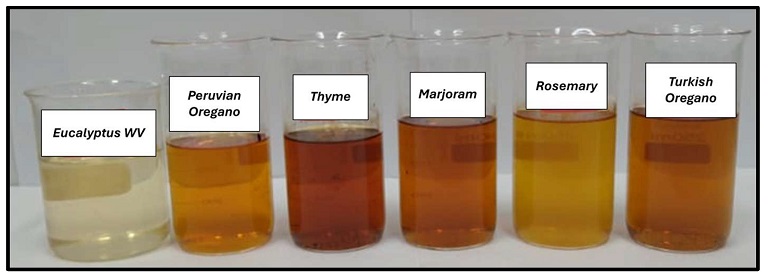Nikhil Prasad Fact checked by:Thailand Medical News Team Nov 08, 2024 1 year, 1 month, 3 weeks, 2 days, 13 hours, 1 minute ago
Medical News: A group of Brazilian researchers from the Federal University of Rio Grande do Norte, Federal Rural University of the Semi-Arid Region, and the National Institute of Metrology, Quality, and Technology have developed a novel antimicrobial solution derived from eucalyptus wood and aromatic herbs. Known as wood vinegar, this unique solution has shown remarkable potential in combating microbial growth, presenting a possible alternative to traditional antibiotics.
 Types of Wood Vinegar produced and assessed in the research
Types of Wood Vinegar produced and assessed in the research
This
Medical News report highlights that wood vinegar, also known as pyroligneous acid, is a product obtained from the carbonization of wood. By incorporating aromatic herbs like thyme, marjoram, and various types of oregano, the researchers discovered that wood vinegar’s antimicrobial properties could be significantly enhanced. Given the growing concerns over antibiotic-resistant bacteria, these findings hold promise for developing new and effective antimicrobial agents.
The Growing Need for Alternatives to Traditional Antibiotics
The study is part of an ongoing search for alternative antimicrobial agents. Antibiotic resistance has become one of the most significant global public health issues, driven by excessive antibiotic use. This resistance threatens the efficacy of many conventional treatments, making it harder to cure diseases and control infections. Wood vinegar, already known for its antimicrobial properties, became a focus for this research, with the goal of further enhancing its effectiveness by combining it with bioactive compounds from specific herbs.
The researchers employed a process called “co-pyrolysis,” which involves heating eucalyptus wood along with a mixture of aromatic herbs. This process allowed essential bioactive compounds to be incorporated into the wood vinegar. Afterward, the antimicrobial effects were tested against several bacterial and fungal strains, including Escherichia coli, Staphylococcus aureus, and Candida glabrata. Chemical profiling revealed the presence of new compounds not typically found in eucalyptus wood vinegar, such as thymol from thyme, which significantly improved the vinegar’s antimicrobial action.
Key Findings: Enhanced Antimicrobial Action
The study yielded some impressive findings. The co-pyrolyzed wood vinegar demonstrated greater inhibitory effects than traditional eucalyptus wood vinegar alone. The thyme-enhanced version, in particular, proved most effective, especially against common and resilient bacteria like Acinetobacter baumanni and Pseudomonas aeruginosa. These bacteria often cause infections in healthcare settings, where they exhibit high resistance to existing treatments.
Researchers measured the Minimum Inhibitory Concentration (MIC) and Minimum Bactericidal Concentration (MBC) to gauge how well the wood vinegar formulations inhibited bacterial growth. For many strains, the thyme-infused wood vinegar showed lower MIC and MBC values than the eucalyptus-only vinegar, meaning less product was needed to inhibit bacterial gro
wth effectively. These findings suggest that adding specific herbs during production could enhance wood vinegar’s efficacy against bacteria, including some that pose a significant health risk.
Chemical Composition Boosts Antimicrobial Properties
Chemical analysis provided insights into how this process enhances the vinegar's antimicrobial properties. Compounds such as furfural, cyclopentanone, acetic acid, and butanoic acid were found in higher concentrations, while others like thymol appeared in the wood vinegar for the first time due to the herbs used in the co-pyrolysis process. These compounds have known antimicrobial effects, contributing to the vinegar’s ability to damage microbial cells, interfere with cell energy processes, and trigger oxidative stress.
Thymol, found in thyme, marjoram, and oregano, is particularly interesting. It’s known to weaken the cell membranes of bacteria, making it easier for other antimicrobial agents to enter and kill the cells. Studies also suggest thymol may enhance the effects of traditional antibiotics when used together, which could offer a unique way to combat antibiotic-resistant strains. This combination effect could potentially allow wood vinegar to be used in tandem with other treatments to improve outcomes against resistant bacteria.
Application and Future Implications
The findings open exciting possibilities for developing natural antimicrobial agents that could serve in various industries. Beyond healthcare, these enhanced wood vinegar formulations could benefit food preservation, livestock, and agriculture, where controlling microbial growth is critical. The potential to create a cost-effective and environmentally friendly antimicrobial solution could offer significant advantages, particularly in countries where access to antibiotics is limited or their use in agriculture is restricted.
However, the researchers noted that there are still challenges to be addressed. Large-scale production of these wood vinegar formulations would require additional studies to refine the process and determine its viability. Additionally, while the antimicrobial properties have been tested in the lab, further testing is necessary to confirm its safety and efficacy in real-world applications.
Conclusion
In summary, the study demonstrates that enhancing eucalyptus wood vinegar with compounds from aromatic herbs like thyme, marjoram, and oregano produces a powerful antimicrobial agent capable of inhibiting a range of bacteria and fungi. With the rise of antibiotic-resistant infections, these findings are particularly relevant and provide a promising path forward in the search for natural, effective antimicrobial solutions.
The study findings were published in the peer-reviewed journal: Antibiotics.
https://www.mdpi.com/2079-6382/13/11/1056
For the latest on antimicrobials, keep on logging to Thailand
Medical News.
Read Also:
https://www.thailandmedical.news/news/thailand-medical-study-unveils-lemongrass-oil-s-powerful-anticancer-and-antimicrobial-properties
https://www.thailandmedical.news/news/thailand-medical-study-identifies-p-pentosaceus-as-a-potential-antimicrobial-probiotic-with-cholesterol-reducing-properties
